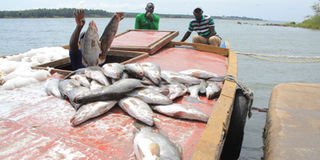Prime
Government fails to regulate fish export prices

Fish at a landing site. Over the years, the exporters have complained of high prices per kilo that they incur from buying fish. PHOTO/FILE
What you need to know:
On October 1, the Fisheries ministry imposed a minimum export selling price of $6 (about Shs23,000) per kilo of fillet in export.
Government has walked back on a fish export prices it implemented just last month with the Ministry of Agriculture, Animal Industry and Fisheries casting the widest nets possible for the willing seller-willing buyer principle.
The U-turn, communicated in a news release by the ministry permanent secretary, is fishy, with allegations that a major European importer colluded with local exporters to influence it.
But officials and technocrats at the ministry were cagey about discussing any further.
“It has been decided to halt the implementation of the resolution regarding the imposition of a minimum export price on fish fillet,” the statement said.
“All stakeholders are free to export fish and fish products at prices that are determined by both the market and the principle of willing buyer/willing seller.”
On October 1, the Fisheries ministry imposed a minimum export selling price of $6 (about Shs23,000) per kilo of fillet in export.
The decision, the ministry has since revealed, followed a resolution from a September 26 meeting with fish exporters and processors associations, as well as independent processors.
The meeting followed concerns amid a decline in fish export quantities and values.
Fish and fish products are the third highest value exports from Uganda after gold and coffee. However, fish exports and value have declined in the past couple of years, especially in the post-Covid-19 restrictions.
In 2020, the total fish exports were worth $127.63m. However, this was a 28 percent decline from 2019 caused by reduced fish production and disruptions from the impact of the pandemic.
Data from the central bank indicates that between June 2020 and July 2021, at least 15,149 tonnes of fish, worth $118.6m (about Shs447.3b), were exported compared to 23,141 tonnes worth $146m (Shs551b) in a similar period during the previous year.
The September consultative meeting controversially voted for price control.
But Daily Monitor understands the decision angered a section of stakeholders, who argued that the intervention was way off the rails for a free-market economy such as Uganda.
Efforts to speak to several exporters, including the leadership of the Uganda Fish Exporters’ Association, were futile as they said they were out of the country.
Mr Sujal Goswami, the chairperson of exporters, instead pointed this reporter to an opinion article by Mr Promise Twinomugisha that was published by this paper last week.
Sources say a section of exporters laid their hook into the freezer, accusing their association leadership of controlling the sector in trying times.
But Mr Twinomugisha, a consultant at chain supplier House of Rehoboth Uganda Ltd, appeared to suggest that there were sinister fishing hooks and baits involved from a European dealer.
The Nile Perch industry, relatively small to its global counterparts, primarily caters to a select group of European customers in the Netherlands, Belgium and the UK.
There is a stark contrast between the $24 (Shs90,000) per kilo of Nile Perch fillets in European supermarkets and the relatively meagre earnings of Uganda producers who currently receive a minimum of $5 for the same quantity.
“This exclusive consortium has come under scrutiny for their alleged collusion to manipulate prices and exert control over the East African lake region,” Mr Twinomugisha said.
The ministry has acknowledged that although the objective of the minimum export price might ensure profitability in the industry, it had “justifiably generated a lot of apprehension”.
“The ministry has carefully considered the feedback provided by all stakeholders, and is committed to addressing their concerns in a manner that supports the continued growth and competitiveness of the fish processing sector,” it said.
The fish processing industry has been facing challenges, especially in the context of the global market dynamics. With dwindling stocks and stringent control by the government that has greatly restricted fish, the prices on the local market have teetered on the brink of tripping exporters.
Over the years, the exporters have complained of high prices per kilo that they incur from buying fish, saying it does not balance their books on the exports side.
Worse still, fish maw exports continue pushing export scales against processed fillets.
Mr Thomas Bukenya, the acting director of fisheries resources at the Ministry of Agriculture, Animal Industry and Fisheries, did not respond to queries on the impact of the decision on the sector it already conceded was on the brink of being lost at sea.
However, in the statement, the ministry said it remains committed to constructive dialogue with fish processors and industry associations to explore measures that will safeguard the industry and promote export-oriented strategy.
[email protected]





